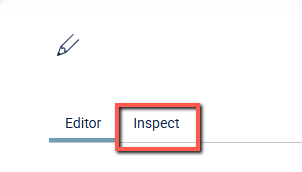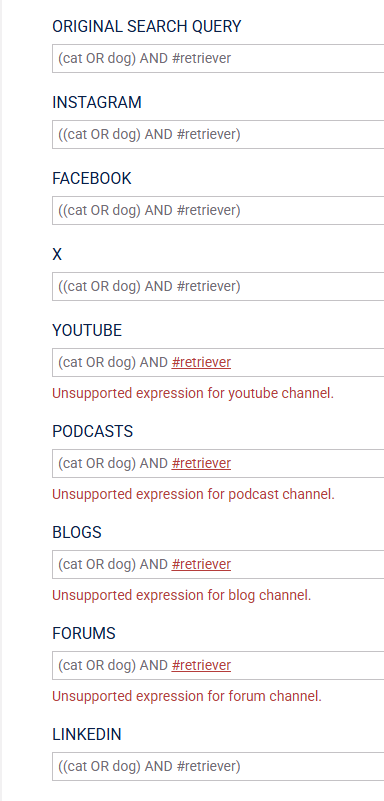Search operators in Listen
If you have administrator privileges for your organization in Listen, you may also have the ability to create and edit boolean searches.
Listen has a powerful search tool that allows searching many different types of social media sources, with the same search query. Below is a short explanation on most of the search operators used, as well as a brief explanation on how Listen validates the search query in regards to the different sources.
This is not a complete explanation of the functionality of searches in Listen, and you may encounter issues the first times when creating new searches. Full technical documentation and assistance is available through your local customer support contact.
Boolean search operators
Listen uses boolean operators to let you combine keywords, phrases and more into search strings which can be as complex as needed. There are also several other operators which allow you to filter by language, search by individual sources, capture mentions of specific accounts and so on.
| Operator | Description |
|---|---|
| OR | Searches for the keyword or phrase to the left of the operator OR the one to the right |
| AND | Searches for the keyword or phrase on the left AND the one on the right. Both must be present. |
| NOT | Excludes keywords or phrases after the operator. |
| NEAR | Searches for keywords within a certain amount of characters from each other. Default is 10. Use NEAR/N to define a specific number (ex. NEAR/20). The number of keywords before NEAR multiplied by the number after, can not exceed 100. |
| ONEAR | Same as NEAR, but the order is specified from left to right. Variant ONEAR/N also works. |
| upper: | Searches for a keyword with the first letter capitalized |
| allupper: | Searches for a keyword where all letters are capitalized |
| hashtag (#) | Searches for a specific hashtag. Either hashtag: or # can be used. Ex. #retriever |
| * (asterisk) | Wildcard search. Use at the end of a keyword to also search for all endings of that word. Ex. house* will search for houses, housing etc. |
| ? | Wildcard to search for any one letter. Ex. ?ouse will search for house, mouse etc. |
| from: | Searches for posts from a specific author. It can be used with the author´s account ID or account name (not case sensitive). |
| to: | Searches for comments or replies to posts from a specific author, including posts sent directly to the author. Use with account name or ID. |
| mention: (@) | Searches for posts that mentions a specific account´s name. @ can also be used, ex. @retriever |
| followers: | Searches for posts whose authors have more than a certain amount of followers. Must be used with a numerical value. Only supported for Twitter/X, Instagram and Facebook. Must be combined with keyword or phrase. |
| blog_name: / forum_name: | Used to search for a specific blog or forum. |
| lang: | Searches for posts written in a specific language. Must be combined with keyword or phrase. Uses ISO 639-1 language codes (external link) |
| socialsource: | Used to search for posts from a specific source. Must be used with keyword or phrase. |
Parentheses and combining operators
In order to allow for longer, or more complex searches, operators and keywords often must be enclosed in parentheses. For example, if we want to search for either of two or more words in combination with another, we need to use parentheses. Searching for house OR mouse AND horse will result in hits containing only house, and also hits containing mouse and horse together.
In order to combine either house or mouse with horse, we have to write the search like this: (house OR mouse) AND horse
The enclosed keywords are treated as one block, and in combination with AND searches for the whole parentheses in combination with the keyword horse. We can add further parentheses in order to create different searches withing the same query, or to make the first one more complex: (((house OR mouse) AND horse) NOT car) OR ((cat OR dog) AND car)
There are certain restrictions on how keywords work inside parentheses. For example OR, NOT and AND can not be used in the same parentheses and when using NEAR, keywords on either side must be enclosed. If you encounter any problems related to writing search queries, feel free to contact our support for assistance.
Validation of search queries
Listen can use the same search query to search many different social media sources, who all have different different functionality or data available. In order to make this possible, Listen attempts to normalize each search to fit each channel respectively.
When creating a search, the tab Inspect can be used to see exactly how Listen has normalized the query for each channel. If any search operator is unavailable for a certain source, this will be shown here, and the operator might be excluded from the search for that particular channel.

It is important to be aware of any unexpected results from the search if a part of the query is excluded. This can lead to unwanted hits, not finding what you are searching for or far too many hits being collected.
In the example below, the search (cat OR dog) AND #retriever results in notifications for those channels where the operator # is not available:

